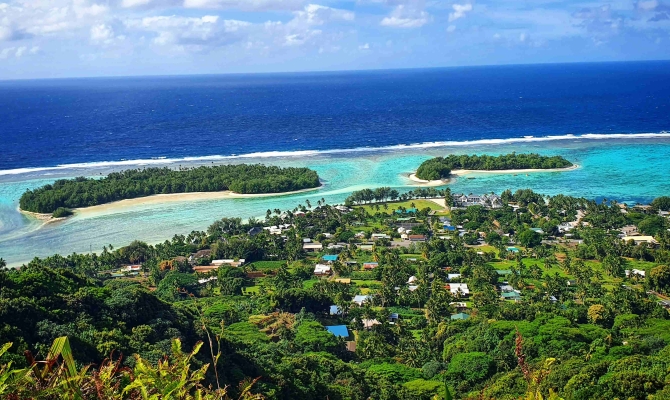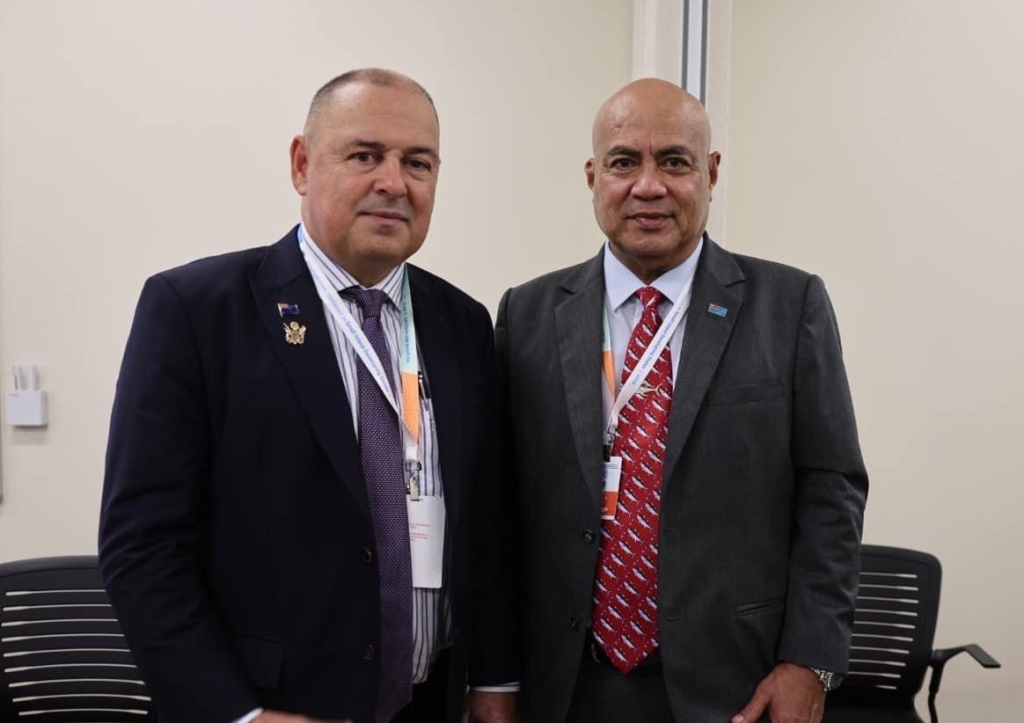
30 May 2024, Antigua and Barbuda - Cook Islands Prime Minister Hon Mark Brown has called for countries on the frontlines of climate change to have their national debt forgiven. Stressed during a special panel at the Fourth International Conference on Small Islands Developing States, Prime Minister Brown, also Chair of the Pacific Islands Forum, stated this will help improve the socio-economic wellbeing of all Pacific peoples.
“Debt restructuring options must be made available for countries devastated by climate disasters so they can prioritise reconstruction over debt repayment."
Climate change exacerbates extreme events. Economic losses from cyclones and flooding in the South Pacific region in 2020 were around USD 1 billion with at least 71 lives lost. Annual average losses are around USD 500 million.
Collectively, Small Islands Developing States contribute to less than 1 percent of the worlds total greenhouse gas emissions, yet are amongst the most vulnerable to its effects. Three of the Pacific Small Islands Developing States are the most vulnerable in the world to the impacts of extreme events.

“To preserve the richness of our Pacific way of life, it is imperative that our economies grow at a sustainable rate amidst the existential threats and impacts posed by climate change and global economic shocks occurring with increased frequency,” presented Prime Minister Brown at the high-level dialogue on “Revitalising SIDS Economies for Accelerated and Sustainable Growth.”
“We must our debt forgiven allowing us to focus on improving our quality of life. This includes bolstering our climate and disaster resilience which involves increasing our share of global climate finance as a Small Islands Developing State.”
The sentiment of needing more accessible climate finance for Pacific SIDS is echoed widely.
H.E Hilda Heini of the Republic of the Marshall Islands stressed this during her statement at the SIDS4 Plenary in Antigua and Barbuda, having been hit with approving USD 1.8 million, a significant hit to their small economy to help the Marshall Islands people facing severe drought and inundation, a direct result of the climate crises.
“In turn, we have less money for health, for education, and for development.” President Heini said.
Vanuatu, as the Chair of the Pacific Small Islands Developing States also called for accelerated global efforts to address climate change comprehensively during their SIDS4 statement to plenary.
“This includes significant increases in financing for adaptation, mitigation and loss and damage, recognising the special circumstances of SIDS in the context of climate vulnerability,” stated Minister of Climate Change for Vanuatu the Hon Ralph Regenvanu.
“Those who are most responsible for the climate crisis, which is the single greatest threat to our security and statehood, must go first, furthest, and fastest. The polluters must pay.”
From 1970 to 2020, Small Islands Developing States lost USD 153 Billion due to weather, climate, and water-related hazards.
The complex, fragmented climate-finance landscape exacerbates capacity constraints in SIDS and places them at a disadvantage compared to other developing countries. SIDS need more capacity to explore alternative and innovative financing structures and instruments, including blended finance.
Forgiving the debt of countries on the frontlines of climate change allowing them to focus on building resiliency is one crucial step that would help SIDS climb the ladder amongst the rising challenges they face from climate change. Impacts that will continue to roll in.
“It makes good sense,” stated Mr Sefanaia Nawadra, Director of the Secretariat of the Pacific Regional Environment Programme (SPREP).
“Our work to support Pacific Islands build their resiliency grows with the climate change impacts we face in our region. Our reality in the Pacific is that we don’t just get the one big hit allowing us years to build back at the cost of millions, sometimes we get hit after hit after hit in the matter of months. Finance plays a huge role in our resiliency. Forgiving debt allowing our Small Islands Developing States allowing us to focus on building our islands is a hand up.”
Pacific Islands Small Islands Developing States are also taking steps to revitalise economies for accelerated and sustainable growth. The Pacific Resilience Facility, a Pacific-led, Pacific-owned solution is a transformative initiative and requires all partners to support capitalisation. It has a starting target capital of USD 500 million for which Australia has committee 100 million and Saudi Arabia 50 million.
“The PRF is the Pacific’s answer to the slow and insufficient access to global climate finance and will serve as a catalyst to accelerate our access to these vital funds,” stated Prime Minster Brown during the high-level dialogue on “Revitalising SIDS Economies for Accelerated and Sustainable Growth.”
Prime Minister Brown also talked to investing and support the essential areas of sustainable tourism growth, sustainable fisheries growth and sustainable agricultural growth to help revitalise Pacific SIDS economies.
“The Pacific region is committed to strategic actions to revitalise our economies and ensure a prosperous future for our Pacific communities. Together, we can build a resilient, sustainable, and inclusive region across all SIDS,” concluded Prime Minister Brown.
The Interactive Dialogue session on “Revitalising SIDS Economies for Accelerated and Sustainable Growth” was held on the margins of the Fourth International Conference on Small Islands Developing States on 29 May, 2024.
The SIDS4 conference is held from 27 to 30 May 2024. It is preceded by the SIDS Children and Youth Action Summit from 24 – 26 May, the SIDS Gender Equality Forum on 26 May, the SIDS Global Business Network Forum from 25 – 26 May and the SIDS4 Private Sector Roundtable on 28 May, 2024.
For more information please visit https://sdgs.un.org/conferences/sids2024
Stay tuned to www.sprep.org and FB: https://www.facebook.com/SPREP.PROE and @SPREPChannel on X (formerly Twitter for more news on the Pacific at SIDS4.